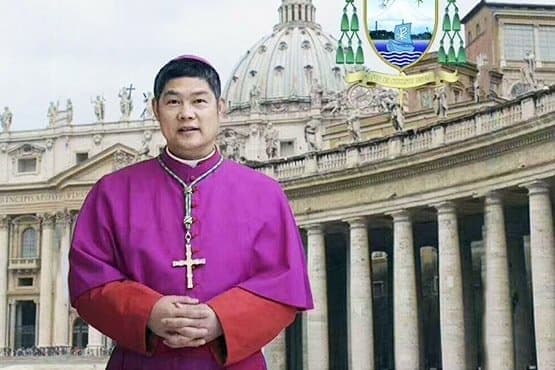LEICESTER, United Kingdom – A leading Catholic member of the UK’s House of Lords is drawing attention to the persecution of the Church in China.
Lord David Alton said in a statement the Chinese Communist Party (CCP) in Beijing is targeting ten bishops after they opposed the Chinese Patriotic Catholic Association, which requires its members to pledge independence from the Holy See and “conform Christian teaching to Chinese communist doctrine.”
Alton posted an article by Nina Shea in the Hudson Institute last week entitled “Ten Persecuted Catholic Bishops in China.”
Alton said seven of these bishops have been detained without due process, with some of them having been under continuous detention for years or decades, while others have been detained repeatedly, up to six times since the agreement’s signing.
Alton called them the “ten inconvenient bishops the Vatican wants us to forget.”
“Why? because they do not accept the right of the Chinese Communist Party to tell them what to believe, think or what to say,” he wrote.
The member of the House of Lords issued the statement as the Vatican celebrated the attendance of bishops from China who were attending the Synod on Synodality. Bishop Joseph Yang Yongqiang of the Diocese of Hangzhou and Bishop Vincent Zhan Silu of Xiapu are the third delegation to attend a Synod, after the 2018 Synod of Bishops on Youth and last year’s first session of the Synod on Synodality.
RELATED: Chinese bishops at synod stress collaboration, enculturation of faith
The Holy See and China made a provisional agreement in 2018 on the appointment of bishops, which has twice been renewed and is expected to be renewed again soon.
Prior to the 2018 agreement, bishops from mainland China were unable to come to Rome for Vatican-sponsored events.
However, some observers have criticized the Vatican for not highlighting the ongoing persecution of Catholics and other religious believers in the officially atheist country.
Quoting Shea’s article, Alton said the CCP has subjected the ten bishops “to indefinite detention without due process, disappearances, open-ended security police investigations, banishments from their dioceses, or other impediments to their episcopal ministries including threats, surveillance, interrogation, and so-called re-education.”
The men are Bishop Vincent Guo Xijin, Bishop Augustine Cui Tai, Bishop Julius Jia Zhiguo, Bishop Thaddeus Ma Daqin, Bishop Peter Shao Zhumin, Bishop Melchior Shi Hongzhen, Bishop James Su Zhimin, Bishop Joseph Xing Wenzhi, Bishop Joseph Zen Ze-kiun, and Bishop Joseph Zhang Weizhu.
In her article, Shea said since the Sinicization policy in 2015, “the Chinese Catholic Church has seen its greatest repression since the Mao Zedong era.”
“The China-Vatican agreement makes no accommodation for the conscientious objectors to the CPCA, who are often called the underground church. Nor does the agreement address religious persecution. The Vatican states that the pact, the contents of which are secret, is narrowly focused on a power-sharing arrangement for episcopal appointments. Yet Beijing has used it to pressure Catholic bishops into joining the CPCA,” Shea writes.
She points out Beijing has unilaterally announced several appointments in an apparent violation of the China-Vatican agreement.
“For the sake of Chinese Catholic Church ‘unity,’ Pope Francis approved these appointments after the fact. But Beijing’s persecution of the 10 bishops in this report is the real threat to the Catholic Church’s unity,” Shea adds.
Alton also sent his followers a copy of George Weigel’s Oct. 17 article in the Wall Street Journal about China’s representative at the Synod.
Weigel said there is “an often brutal effort” to impose “Sinicize” religious communities, bringing them into conformity with “Xi Jinping Thought” – referring to China’s president.
“The Chinese regime assigned Bishop Zhan Silu to his diocese in 2000. The bishop incurred excommunication for accepting consecration as a bishop without papal approval, a grave ecclesiastical crime. He was subsequently reconciled to the church in 2018 but a year later publicly vowed ‘to carry out the Sinicization of religion with determination’ and ‘continue to follow a path that conforms to socialist society’,” Weigel wrote about one of the Synod participants.
He also pointed out the other representative from China is vice president of the Chinese Catholic Patriotic Association.
“Bishop Yang’s position in the CCPA further deepens the gulf between the regime-controlled church in China and the sorely beset underground church, which has remained loyal to Rome even as its clergy and laity are jailed or martyred,” Weigel wrote.
The American author – who was the biographer of Pope John Paul II – said the Vatican’s interaction with China has been “an abject failure.”
Weigel said Francis seemingly agreed to the new deal “because his diplomats persuaded him that cutting that deal—and later welcoming men like Bishops Zhan and Yang into the synodal fold—was a step toward full diplomatic relations” between the Vatican, which currently has relations with Taiwan.
“Meantime, the pursuit of this diplomatic fantasy has muted the Vatican’s voice on behalf of all persecuted believers in China,” he writes.
“The pontiff says he is ‘happy with the dialogue,’ the results of which have been ‘good.’ They are, in truth, a disgrace,” Weigel says.
Follow Charles Collins on X: @CharlesinRome












